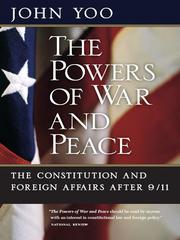| Listing 1 - 2 of 2 |
Sort by
|

ISBN: 1281966886 9786611966881 0226960331 9780226960333 9780226960319 0226960315 9781281966889 6611966889 Year: 2005 Publisher: Chicago : University of Chicago Press,
Abstract | Keywords | Export | Availability | Bookmark
 Loading...
Loading...Choose an application
- Reference Manager
- EndNote
- RefWorks (Direct export to RefWorks)
Since the September 11 attacks on the United States, the Bush administration has come under fire for its methods of combating terrorism. Waging war against al Qaeda has proven to be a legal quagmire, with critics claiming that the administration's response in Afghanistan and Iraq is unconstitutional. The war on terror-and, in a larger sense, the administration's decision to withdraw from the ABM Treaty and the Kyoto accords-has many wondering whether the constitutional framework for making foreign affairs decisions has been discarded by the present administration. John Yoo, formerly a lawyer in the Department of Justice, here makes the case for a completely new approach to understanding what the Constitution says about foreign affairs, particularly the powers of war and peace. Looking to American history, Yoo points out that from Truman and Korea to Clinton's intervention in Kosovo, American presidents have had to act decisively on the world stage without a declaration of war. They are able to do so, Yoo argues, because the Constitution grants the president, Congress, and the courts very different powers, requiring them to negotiate the country's foreign policy. Yoo roots his controversial analysis in a brilliant reconstruction of the original understanding of the foreign affairs power and supplements it with arguments based on constitutional text, structure, and history. Accessibly blending historical arguments with current policy debates, The Powers of War and Peace will no doubt be hotly debated. And while the questions it addresses are as old and fundamental as the Constitution itself, America's response to the September 11 attacks has renewed them with even greater force and urgency. "Can the president of the United States do whatever he likes in wartime without oversight from Congress or the courts? This year, the issue came to a head as the Bush administration struggled to maintain its aggressive approach to the detention and interrogation of suspected enemy combatants in the war on terrorism. But this was also the year that the administration's claims about presidential supremacy received their most sustained intellectual defense [in] The Powers of War and Peace."-Jeffrey Rosen, New York Times "Yoo's theory promotes frank discussion of the national interest and makes it harder for politicians to parade policy conflicts as constitutional crises. Most important, Yoo's approach offers a way to renew our political system's democratic vigor."-David B. Rivkin Jr. and Carlos Ramos-Mrosovsky, National Review
War and emergency powers --- Presidents --- United States --- Foreign relations --- Law and legislation. --- constitution, terrorism, foreign affairs, military, 9/11, bush, al qaeda, iraq, afghanistan, kyoto accords, abm treaty, history, politics, political science, nonfiction, presidency, executive power, declaration of war, congress, kosovo, intervention, clinton, korea, truman, wartime, enemy combatants, interrogation, detention, emergency powers.
Book
ISBN: 9780520959255 0520959256 9780520283343 9780520283367 Year: 2018 Publisher: Berkeley, CA : University of California Press,
Abstract | Keywords | Export | Availability | Bookmark
 Loading...
Loading...Choose an application
- Reference Manager
- EndNote
- RefWorks (Direct export to RefWorks)
In the decades after World War II, tens of thousands of soldiers and civilian contractors across Asia and the Pacific found work through the U.S. military. Recently liberated from colonial rule, these workers were drawn to the opportunities the military offered and became active participants of the U.S. empire, most centrally during the U.S. war in Vietnam. Simeon Man uncovers the little-known histories of Filipinos, South Koreans, and Asian Americans who fought in Vietnam, revealing how U.S. empire was sustained through overlapping projects of colonialism and race making. Through their military deployments, Man argues, these soldiers took part in the making of a new Pacific world-a decolonizing Pacific-in which the imperatives of U.S. empire collided with insurgent calls for decolonization, producing often surprising political alliances, imperial tactics of suppression, and new visions of radical democracy.
Imperialism --- Vietnam War, 1961-1975 --- Vietnam Conflict, 1961-1975 --- Vietnamese Conflict, 1961-1975 --- Vietnamese War, 1961-1975 --- History --- Participation, Asian Americans. --- Participation, Korean. --- Participation, Filipinos. --- Pacific Area --- United States --- Asia-Pacific Region --- Asian-Pacific Region --- Asian and Pacific Council countries --- Pacific Ocean Region --- Pacific Region --- Pacific Rim --- History, Military --- 20th century history. --- american crossroads series. --- american empire. --- american military. --- american studies. --- asia. --- asian americans. --- civilian contractors. --- colonial rule. --- colonialism. --- decolonialization. --- democracy. --- empire. --- enemy combatants. --- filipinos. --- history. --- korean war. --- military deployments. --- military. --- political alliances. --- race making. --- racial liberalism. --- radical democracy. --- second world war. --- soldiers. --- south korea. --- suppression. --- the pacific. --- the philippines. --- troops. --- united states military. --- vietnam war. --- vietnam.
| Listing 1 - 2 of 2 |
Sort by
|

 Search
Search Feedback
Feedback About UniCat
About UniCat  Help
Help News
News